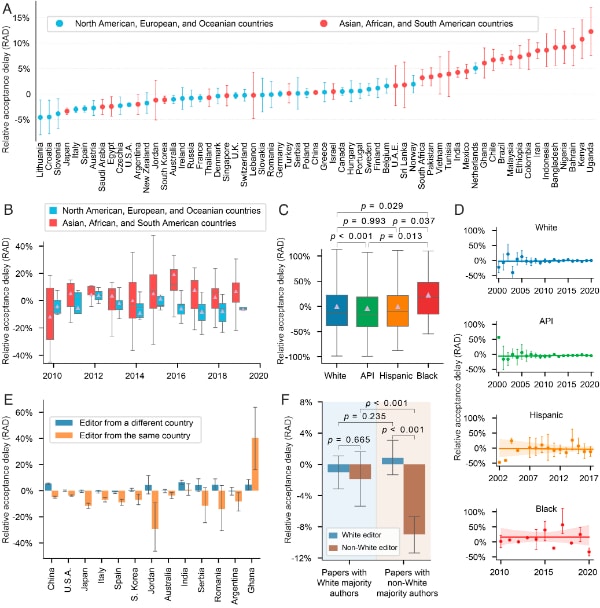Project Summary
Scientific editors play a crucial role in shaping academic journals and setting standards, but there is limited understanding of the gender makeup of editors, their publishing practices, and potential conflicts of interest they may face. To address these gaps, we conducted a study using algorithmic tools to infer the gender of 81,000 editors across 1,000 journals and 15 disciplines.
Our analysis revealed a gender gap among editors, with only 14% being women and an even smaller percentage among editors-in-chief. Additionally, we found that career length explains the gender gap among editors, while self-publishing rates were higher among editors-in-chief. Furthermore, we examined the racial and geographical disparities in editorial board composition and the impact on manuscript acceptance delay and citation rates.
Our study encompassed a dataset of 1,000,000 papers published between 2001 and 2020 from six publishers. We discovered that many countries in Asia, Africa, and South America have fewer editors than expected based on their share of authorship, with Black scientists in the United States being the most underrepresented group. Moreover, papers from these regions experienced longer acceptance delays, and Black and Hispanic scientists received significantly fewer citations compared to their White counterparts. In addition to gender and racial disparities, we investigated conflicts of interest among editors and their collaborations with authors. Despite existing policies, we found instances where editors handled papers from their recent collaborators, potentially compromising the integrity of the editorial decision. These findings emphasize the need for policy reforms to address these challenges and ensure fairness in scientific publishing.
Publications
1. Fengyuan Liu, Talal Rahwan, Bedoor AlShebli. “Non-White scientists appear on fewer editorial boards, spend more time under review, and receive fewer citations.” Proceedings of the National Academy of Sciences (2023).
Media Coverage: Nature, University World News, EurekAlert!, Phys.org, Science & Development Network, American Physical Society, Physics World.
2. Fengyuan Liu, Petter Holme, Matteo Chiesa, Bedoor AlShebli, Talal Rahwan. “Gender inequality and self-publication are common among academic editors” Nature Human Behavior (2023).
Media Coverage: Nature; Times Higher Education; Nature Middle East; Khaleej Times; Nature News & Views; EurekAlert; New Scientist.
Works in Progress
1. Fengyuan Liu, Bedoor AlShebli, Talal Rahwan. “Editors handle their collaborators’ submissions despite explicit policies”, under review.
2. Fengyuan Liu, Nouar AlDahoul, Gregory Eady, Yasir Zaki, Bedoor AlShebli, Talal Rahwan. “Self-reflection outcome is sensitive to prompt construction”.
Talks
1. “Editors handle their collaborators’ submissions despite explicit policies” in ICSSI 2024, Washington DC and IC2S2 2024, Philadelphia, PA.
2. “Non-White scientists appear on fewer editorial boards, spend more time under review, and receive fewer citations” at: IC2S2 2023, Copenhagen, Denmark, and ICSSI 2023, Chicago, IL.
3. “Gender inequality and self publication are common among academic editors” at: IC2S2 2022, Chicago, IL and ICSSI 2023, Chicago, IL.
4. “Inequality and Conflict of Interest in Academia”, Biology Program Seminar Series at NYU Abu Dhabi.
5. “A Global Perspective of Scientific Publications” at Department of Informatics and Network Systems, University of Pittsburgh.
